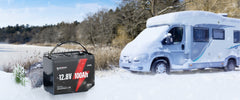
Which Batteries Perform Best in Cold Weather?
, 4 Tiempo mínimo de lectura


, 4 Tiempo mínimo de lectura
As it gets colder, staying warm, indoors, and enjoying the amenities we have become the norm: a hot cup of coffee and a warm meal, a hot shower, and a heater or an electric blanket. Whether you live in a residential home or off-grid in a cabin or RV, these small comforts have one thing in common: energy.
Having a reliable energy source is crucial to staying safe and even having small comforts when you’re up against the extreme cold. Knowing your options, and knowing which options perform best in the cold weather can give you the upper hand this coming winter.
In cold weather, batteries are prone to be less effective due to the slowing chemical reaction within the battery. The electrolytes inside thicken, slowing them down and reducing the flow of electrical current. As this happens, there is a decrease in the performance of whatever is using the battery.
The performance reduction also affects the motor in different ways, most notably the difficulty in starting and causing a shorter runtime. Likewise, due to the thickening of the electrical current, the charging efficiency will be lower meaning that the battery charging will slow down and the battery capacity will reduce in the lower temperatures.
Different battery types react differently to cold weather and plunging temperatures. Some batteries can handle the cold better than others. Nevertheless, freezing temperatures are common and any battery reaching those levels will see a sharp decline in battery lifespan without the proper BMS. Nevertheless, each battery type will react differently to the cold than the others.
Lead-Acid Batteries
Lead-acid batteries are traditional batteries for cars and backup battery power. In cold weather, there is very little resistance to the plunging temperature; as such, any vehicle with a lead-acid battery has difficulty starting the engine and will rapidly drain the power of the battery.
Lithium-Ion Batteries:
Lithium-ion batteries are very common in modern electronics and EVs. These batteries tend to perform better in the cold, but there are still limits to their capabilities in the cold. Often, they require additional thermal management systems to operate properly in the cold.
LiFePO4 (Lithium Iron Phosphate) Batteries:
Lithium iron phosphate batteries (LiFePO4) are another type of lithium battery that’s used for larger systems, including solar. They perform excellently in cold conditions, boasting a stable discharge and charge rate, and are less prone to damage, making them very suitable for long-term use.
When all is said and done, you need a battery that is dependable and resistant to cold weather. As such,
LiFePO4 batteries perform best in cold weather conditions in comparison to other types of batteries, including:
One of the major benefits of using a LiFePO4 battery is that some of the batteries include a built-in heating system. For example, Sunrich Energy’s line of LiFePO4 batteries contains an internal heating system that, when the temperature drops below 5°C/41°F, an internal heating automatically turns on. This prevents the battery from freezing, warming the battery up and shutting off when the temperature reaches 10°C/50°F. This keeps the battery running even in the most extreme temperatures, keeping you and your families safe and comfortable.
Even though LiFePO4 batteries are known for their low-maintenance needs, there is still some upkeep to them that you should do in cold conditions. In fact, this advice can be attributed to other batteries; you never want to be without energy during extreme drops in temperature.
The Sunrich Energy 12V 100Ah LiFePO4 Battery is the perfect battery for cold weather. Its intelligent heating BMS automatically activates at 5°C, stops at 10°C for efficiency, and disconnects charging at 0°C to prevent damage. This battery is recommended for RVs, off-grid systems, and camping, offering reliable power in freezing temperatures.
Staying warm with reliable power is crucial to staying safe and comfortable during extreme cold. LiFePO4 batteries are tried and tested to withstand freezing temperatures, providing reliable energy to anyone who needs it.